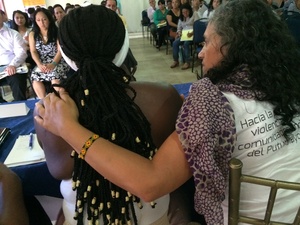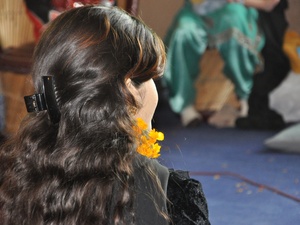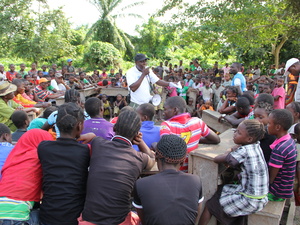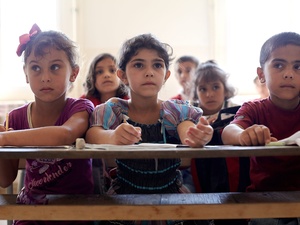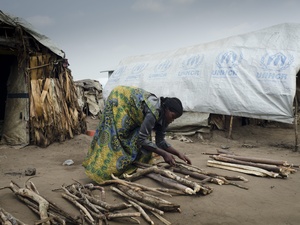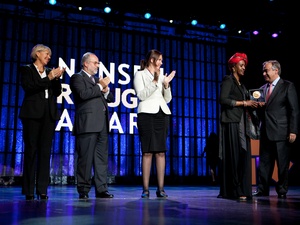16 Days of Activism: Mama Hawa's fight against sexual violence
16 Days of Activism: Mama Hawa's fight against sexual violence

Nansen Refugee Award winner Mama Hawa at an event in Nairobi to mark the 16 Days of Activism Against Gender Violence.
NAIROBI, Kenya, December 10 (UNHCR) - When a mother is raped in the night in Mogadishu, her children still need her to prepare breakfast in the morning.
This was the stark message from Amina Hagi Elmi, executive director of Save Somali Women and Children (SSWC), at a recent tribute in Nairobi to this year's Nansen Refugee Award winner, Hawa Aden Mohamed. The gathering also marked the annual 16 Days of Activism Against Gender Violence.
The Mogadishu-based SSWC has been working with "Mama" Hawa's Galkayo Education Centre for Peace and Development (GECPD) to counter sexual and gender-based violence in the Somali capital and elsewhere in the country, and to help the surviving victims to regain their dignity and to become self-sufficient.
"I was born in Mogadishu and grew up there. I was witness to what went on and am still witness to what's going on," Hagi said. "As long as Mogadishu continues to experience instability and insecurity, GBV [gender-based violence] will continue. Rapes are taking place hour by hour, night by night," she added.
In response, Hagi Elmi and SSWC, one of UNHCR's partners in the Somali capital, established the Hawo Taako Crisis Centre to provide women with access to medical treatment, trauma counselling, legal aid and livelihood support. "We want to give them a livelihood. We want to help them rebuild their dignity," she said. With UNHCR support, SSWC distributes dignity kits to survivors of GBV and rape.
UNHCR Somalia Representative Bruno Geddo spoke of how rape represents a "triple jeopardy" for women and girls in Somalia, while adding that Mama Hawa is working tirelessly to counter it. "There is a triple jeopardy: the jeopardy of the mind, the jeopardy of the body and the material jeopardy that you will not be able to fend for yourself as a result," he said.
"You are mentally traumatized, physically affected and, because of the traditional make-up of Somali society, you carry a stigma even though you are the one raped, because it is seen as having intercourse outside of marriage. Because of this stigma you may find yourself thrown out of your family, and then you can't even make a living because you are left on your own."
He added that Mama Hawa tackles this on all three levels: "GECPD provides access to medical services, counselling to reduce mental trauma, small micro-finance business loans and training so that survivors of rape can rehabilitate themselves and rebuild their lives."
Eliana Irato, country director of the Italy-based Gruppo Relazioni Transculturali, noted meanwhile that there were only three psychiatrists in the whole of Somalia and no psychologists. "All we can provide is best described as 'emotional support' to survivors of rape as professional psycho-social support requires psychologists," she said.
In the northern Somalia town of Galkayo, GECPD is even providing a safe haven where GBV survivors can go. The organization has also developed a mechanism to register all sexual assaults and victims. "Why? Because people come and tell us, 'You are lying, this doesn't happen.' We were told there is no GBV and that we were lying," Mama Hawa said.
The former refugee had to miss the Nansen Refugee Award presentation ceremony in October, but in a video message she stressed: "It's time for the culture to change. We need to keep the good and let go of the bad. And the good is to empower the girl."
The 16 Days of Activism is an international campaign. The theme this year is, "From Peace in the Home to Peace in the World: Let's Challenge Militarism and End Violence Against Women!" The campaign ends today, International Human Rights Day. It brings together UNHCR, partners, people of concern and host communities worldwide in a united call to end sexual and gender-based violence in all its forms.
By Andy Needham in Nairobi, Kenya


